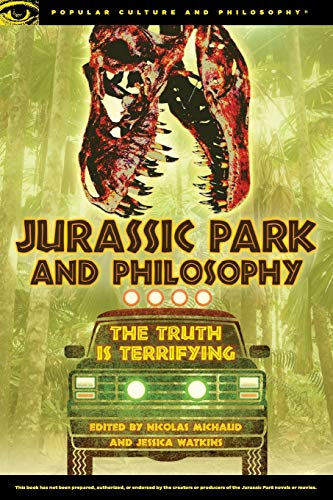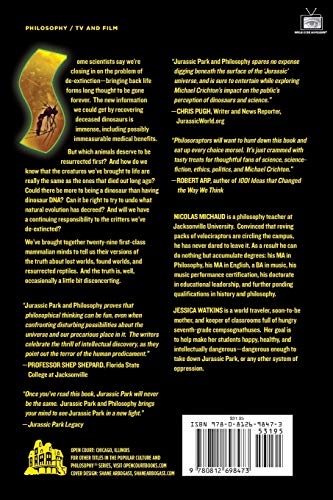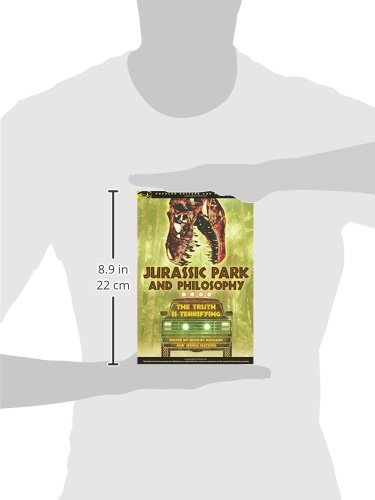Deliver to Sri Lanka
IFor best experience Get the App




Full description not available
D**R
Four Stars
Met Dr. Michaud in October. Really interesting dude!
H**S
Satisfied. As described.
Satisfied. As described.
R**P
Good stuff!
A great assortment of truly interesting and well-written articles.
R**N
Hey wait, this book actually does expand our understanding of Jurassic Park!
Jurassic Park and Philosophy is arguably one of the best books in the Pop Culture and Philosophy series because it really does further the reader’s understanding of issues raised by the Jurassic Park films and books. While you might expect this of all the books in the series, the meaning of Pop Culture and Philosophy is not always clear. Does it mean a piece of pop culture is presented alongside a bit of philosophy? Does it mean the articles find ways to introduce readers to topics in philosophy whether or not they further our understanding of the pop cultural entity in the title? Actually, I think this is the case more times than not, although the previous scenario happens as well. Or does it mean, let’s take a closer look at the philosophical issues that the pop cultural entity actually raises so that we can understand it better. This is the best case scenario and what Jurassic Park and Philosophy does. By the way, the previous situations are points raised in criticisms on Amazon about other books in the series. Below I summarize each of the articles in the first half of the book in order to demonstrate my point that this one actually does what we want it to do.First, the prose of the editors is truly a pleasure, not a task, to read. They clearly have a talent for both informing and entertaining us. This is clear in what serves as a preface, in the introductory article titled “Damn You, Michael Crichton!”, that is, for making us afraid of science, and later in Nicolas Michaud’s article “When You Go Extinct, You Don’t Get to Come Back”, emphasis on “You”.The first section in the book is titled “Present at the Creation”. It contains five articles including the damned one. In “Let the Raptors Run!” (three of the book’s twenty-seven article titles end with an exclamation point), Greg Littmann gives us some details of current plans biologists have for actually reviving extinct species by filling in missing DNA gaps. He asks should we raise the dead? What would it do to the ecosystem? Should we value all life equally as deep ecologists have suggested? He suggests we look back to John Stuart Mill’s Utilitarianism for guidance about our moral responsibilities toward animals.In “The Past in a Petri Dish”, David Freeman takes on some of the questions we might have about paleontology: What kind of evidence does it use? What is a dinosaur? Can a dinosaur be build out of a chicken egg, which he explains is a scenario being played out right now at McGill University. If so, is that a “real” dinosaur? That the same question is asked in Jurassic Park is proof enough that Freeman is really taking on issues raised in books and films.In “Runaway Memes” Brendan Shea points out that we (well, maybe not all of us directly but certainly corporations like Monsanto and their detractors) are currently making decisions about genetically modified organisms and implementing those choices in the real world. The article discusses the history of modern scientific beliefs about the origin of species and evolution.In “Beer and Dinosaurs” Adam Barkman and Nathan Verbaan set up an imagined scenario in which a student bumps into a philosophy professor in a pub and proceeds to ask about the ethics of John Hammond’s cloning dream. They discuss consequences of cloning in terms of a soul or the absence of such. They then turn to the questions of if there was a “reason” dinosaurs became extinct and whether it would be dangerous to bring them back. The dialogue eventually takes up the question of the ethics of having zoos.The second section of the book is called “Life Has Lost Its Way”. In the first article in this section, titled “Why Not Play God?”, Vincent Billard talks about the implications of the fact that we are thrilled to see dinosaurs on the screen but think it’s a bad idea to really bring them back to life. He discusses how philosophy is often about controlling our lives and how to live better. In a related way, Jurassic Park raises questions about the power of humans over life in general. He then turns to the question that is the title of his article, “Why Not Play God?” In this context, he discusses the ethics and issues surrounding creating new dinosaurs (not “real” dinosaurs) and otherwise “enhancing” nature.“Is the Essence in the Amber?” Evan Edwards takes on a biologist’s complaint about Jurassic Park by invoking a philosophical argument that the essence of a thing is not isolated in its genetic code.In “Bring Back the Dinosaurs!” John R. Fitzpatrick begins by comparing Michael Crichton’s books with the movies. He notes that while the movies provide a more “vivid” experience, the writings more strongly express Crichton’s fear of short-sighted scientists. Fitzpatrick then discusses a number of related writings about the harmful effects of pesticides, ethicist Peter Singer’s advocacy of vegetarianism and ending factory farms, and Robert Elliot’s argument against “faking nature” by restoration. In the end Fitzpatrick argues that these writers undervalue the potentiality of “respectful restoration.”In “Flea-Market Capitalism” Timothy Sexton states “you can’t separate discovery of knowledge for the ability of make money.” From this he continues that the wealthiest among us have the ability to influence how we think things are naturally, for example, that CEOs are more important than hourly workers. This situation is what allows John Hammond to risk the lives of children in order to test his park and to exploit under-funded scientist in his service. Sexton describes this in terms of Thorstein Veblen’s Theory of the Leisure Class, explaining that the value of Tim’s goggles to the lawyers is not in their intrinsic utility, but their physical weight.In “Do dinosaurs Really Scare Us?” Michael J. Muniz asks if the Jurassic Park movies and books can rightly be called “horror”. He raises issues of perception and knowledge, pointing out that movies are “real” in some sense. This is the “paradox of fiction”. Muniz believes that terrorizing children in the movie theater with onscreen scenes of terrorized children is a mandatory element in the films of Steven Spielberg. So, if asked if we have ever witnessed a murder, the answer must be yes, many times in movies. The article considers various philosophers’ views on the reality of fiction.The third section of the book is called “Unnatural Selection”. The section’s first article is “What’s It Like to Be a T. rex?” by Rick Stoody. In it, the author draws our attention to the philosophical question of whether dinosaurs and humans can rightly be said to be entirely physical beings. Does consciousness add more or something other than physicality? Physicalists say “no”, dualists say “yes”. Stoody believes that science does solve this because it only discovers facts about the observable world. He then points out that if a scientist were colorblind, the observations would turn out a certain way. Likewise, all observations are bound by the limits of the perceiver.In “Feathering the Truth”, Brandon Kempner writes about the implications of what he sees as our culture’s growing preference for unreality over reality. We know that the Jurassic Park dinosaurs are fake in every way: the characters know they are genetically engineered theme park monsters, they are outdated in that they have scales and not the feathers that scientists now say they would have had, and the audience is aware that it is all done by special effects. Kempner relates this to our broader attraction to unreality in plastic surgery, Facebook, video games, etc., calling it “a crisis of our time” and the “end of reality”. He cites writing about the invention of the “hypereal” and likens the situation to a child’s love (his own love as a child) of blue raspberry snow cones. Accordingly, the problem with losing touch with reality is that reality is what philosophers have found to be most important. It is the bases for ideas about the true and the good.In “Raptor Rights”, John V. Karavitis describes the attitudes about animal rights in the first three Jurassic Park movies according to philosophers. In the first movie, the view is that animals are property and no morality goes with that. In the second, animals don’t have rights but deserve some respect. In the third, they deserve respect and have rights in that they deserve to be left alone. According the Karavitis, the attitude of the first movie corresponds to Aristotle’s view that animals are property. He relates the attitude in the second movie to Kant’s view that only humans are rational and therefore deserving of moral consideration; however animals are due some respect for indirect reasons. In Jurassic Park III, humans and animals are equal in these respects. According to Karavitis, this mirrors the view of Tom Regan, who argues in The Case for Animal Rights, that animals have inherent value.So, that takes us to page 142, which is exactly one half of the book. You can see by these summaries that in the articles the authors indeed address real issues in the Jurassic Park movies and books and expand our knowledge about them. The remainder of the book is equally helpful and fun as I will leave it to you to discover.
E**E
I really love the philosophy/pop culture series
I really love the philosophy/pop culture series, I have the Game of Thrones book too. They are an insightful and enjoyable read for fans who sit and ponder 'what if...?'I'm a huge JP fan, so was delighted when I came across this. This book covers various angles, not just the scientific 'Is it possible,' but topics such as 'Superiority as weakness' featuring an interesting conversation between Alan Grant and Ian Malcolm, 'Good Intentions,' and 'Raptor Rights'.Recommended for fans of the film, deep thinkers, and those who want to be prepared to argue for Dino rights when some future scientist 'has a vision' ;D
L**Y
Really
It jurassic park do you need more info
T**R
Solides Lesewerk
Viele interessante Beiträge zu philosophischen Abhandlungen mit Jurassic Park als Grundgerüst.Natürlich sind auch enige "meh"- Beiträge dabei, aber es gab mir hier und dort frische Gedanken.Eine der Artikel sorgte sogar dafür, dass ich Jurassic Park 3 eine Chance gab - und es nun respektiere.Also... Für Fans :)
Trustpilot
2 days ago
5 days ago